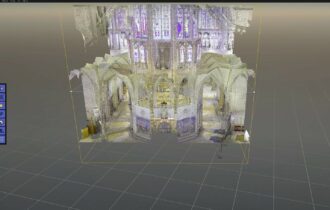
Metaverse: Examples and Use Cases for companies
In recent months the word “metaverse” has appeared in practically all media and on more than one occasion. Although it may seem like a science fiction idea, it is having such an impact because of the great possibilities it offers, in addition to the fact that it could mean the future of the way we relate to each other or work.
Advances in virtual reality technologies, 5G networks, blockchain, and NFTs make it possible that this idea of a parallel universe will be feasible shortly. Beyond the world of video games, metaverses offer an excellent opportunity for companies in any sector that want to join this revolution. We explain what it is and examples and use cases for businesses.
Metaverse definition
The metaverse is defined as an interconnected virtual world and the near future of the next stage of the Internet. The metaverse will involve a richer, experiential, and interconnected Internet experienced in the first person.
The term was first coined in 1992 by writer Neal Stepherson in his novel ‘Snow Crash’ and has now taken on a character away from science fiction to become an immersive world more closely linked to the real world. It allows social and economic interaction through virtual avatars that move in cyberspace and replicate the real world.
The metaverse will be like an extension of the real world and create a larger world. It will not be for everyone, but whoever wants to pass through it will have opportunities to carry out certain activities such as buying, selling, and interacting with others, attracting companies to be present in this world extension. Here are some examples of metaverse.
Visual Metaverse
The possibilities offered by metaverses are countless, both for individuals and companies, thanks to their openness and interoperability. This will make this virtual universe composed of several interconnected spaces in which we will be able to move between them.
It will be the perfect place to work, meet, create, shop or be a more playful space. It will have a full-fledged economy and be a large-scale workspace where users can interact and communicate with other users in a way never seen before. Companies will be able to increase their social presence or revolutionize traditional office work.
As this is such a significant opportunity, many technology companies are investing in developing their own examples of metaverse that incorporate elements that the metaverse will have, such as Microsoft, Nvidia, Alibaba, and Epic Games.
Facebook Metaverse
The company investing the most effort and capital in its metaverse is Facebook. Mar Zuckerberg’s metaverse has already begun with the name change of his iconic company to Meta. It has already launched the first project: Horizon, with Workrooms, Worlds, Home, and Venue. It is a virtual reality platform that allows teleworking and offers the possibility of having a desk, attending meetings, or leaving digital documents in our workplace.
But it is not the only thing, because its objective is to offer the same experiences that can be lived in the real world, such as concerts, stores where we can try on clothes, drive a virtual car, play with other users, etc. All this is from anywhere in the world and with the avatar we create.
Zuckerberg also wanted to propose a more human side, highlighting that the metaverse will allow us to interact with people who are geographically far away but through an experience that brings us closer and will enable us to perform everyday activities as if we were next to each other.
In this race to launch spaces that bring us closer to what could be experienced in the metaverse, Meta has taken the lead, although we are still facing an idea that has a long way to go. This is a double-edged sword, as the possibilities are endless right now, but we will have to wait to see what direction Facebook’s metaverse takes and how accessible it will be in the future.
Investing in the metaverse
The fact that many technology companies are investing in the metaverse is one of the keys to seeing the importance of these digital worlds in the future. The weight of developing them will be possible thanks to the development and advances that virtual or mixed reality technologies and devices have been having in recent years.
But the metaverse is not only for companies with experience in development but also an excellent opportunity for companies from all sectors that want to give greater visibility to their business and reach more users.
Metaverse and new marketing strategies
One example is the possibility of adding new marketing opportunities, such as placing ads that track visibility in real-time and in a way that mimics the environment.
The opportunities are limitless, and the possibility of unlocking new marketing strategies only depends on the creativity and ingenuity of the companies that join this virtual universe. One example is the strategy developed by the food brand Wendy’s in the game Fortnite. Introducing an avatar that simulated its mascot made it easier for the brand to advertise the quality of its product in a fun and less invasive way. This resulted in a 119% increase in social media mentions, as well as winning numerous prizes.
Metaverse and hybrid work
But it’s not the only thing because the metaverse is a unique opportunity for companies that have decided to switch to a hybrid work model. We have become accustomed to using various online communication tools. Still, the metaverse would mean breaking down the barriers imposed by screens and bringing team members together as if they were gathered in the same room. And not only applied to an office but also events, trade shows, and conferences.
Creating a virtual workspace would mean improved productivity, greater fluidity in sharing ideas, and achieving that feeling of a united team without barriers of space.
Tourist metaverses
Another of the great possibilities offered by metaverses is focused on the tourism sector. We have already been able to see and experience virtual trips or tours without having to be there physically. However, virtual reality tourism is a format that still has a long way to go.
With the advances of AR and VR to create metaverses, an immersive world that offers a first-person experience with 360º content can be achieved. An example is a proposal that Disney World and its “metaverse” experience in its theme park transcend physical and digital barriers.
The possibilities to increase sales, visibility, and advertising actions within the metaverse are endless. You just need a 3D development company to help and guide you on this path to make the most of its opportunities. Evergine provides the perfect opportunity to create customized virtual spaces that adapt to the needs and requirements of each company. Don’t miss our metaverse proposal applied to the entertainment industry!
There are no barriers to your ideas, we take care of making them come true.


